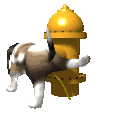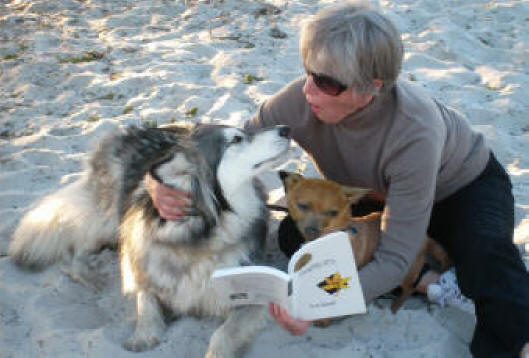

I
owe my daughter, Melanie, the most heartfelt thanks for helping me
to discover something really basic about myself.
In
response to a fourth grade assignment, she advised me that I was to
be the subject of an interview. I was delighted at the prospect and
immediately sat down at the dining room table where the interview
was about to begin. It was the simplest of interviews, consisting
of only two questions.
“Dad,” she began, “what do you like most about your job?” In
twenty-three years of practicing veterinary medicine, amazingly
enough, I had never been asked that particular question. People
usually asked and answered their question before I had even had a
chance to respond. “You must love animals,” or, “You must love
being a veterinarian,” they would state. They were right, but now I
was being asked to focus on precisely what it was that made my
occupation my avocation.
At
first, the answer was not obvious, but suddenly I was saying,
“Melanie, I think that what I like the most is that I get a chance
to be helpful-- I just love being helpful.” Sure enough, my day was
constantly filled with sick animals and apprehensive owners -- and
ninety-five percent of the time I could remedy my patients’ maladies
and assuage the frayed nerves of their human companions -- how
terrific!!
The
second question was immediately forthcoming. “What don’t you like
about your job?” Melanie inquired.
“The rest of the bullshit,” I answered, rather wryly, I thought.
“Dad, I’m in the fourth grade; I can’t say that,” giggled
Melanie.
“Mel,” I sighed, “What do you think I meant when I said, ‘the
bullshit?’
Tentatively, she replied, “It’s the nonsense, the nonsense that goes
on every day.”
“Exactly,” I said with a big grin spreading across my face. “But
remember, every job has its nonsense, so hopefully the basic things
that you like about your job will make up for anything else.”
The
basic truths that emerged from our discussion recur to me almost
every day, but the results of getting to help people and their pets
are sometimes hard to predict. For example, a woman came in one day
with a problem relating to her dog’s urinary tract.
Urinary incontinence is a commonly seen affliction in older, spayed
female dogs. The biomechanics of this problem are really quite
simple. Estrogen is a hormone produced by the follicles in the
ovary. When a female is spayed, (the technical name for the surgery
is an ovariohysterectomy—this means that the surgeon is removing (ectomy)
the ovaries (ovario) and the uterus (hyst- as in hysteria—thank you
Sigmund Freud)). Hormonally speaking, the effect of the
ovariohysterectomy is to drastically reduce the blood levels of
estrogen. Besides the obvious secondary sexual effects that
estrogen controls, there is the not too obvious effect of
maintaining the tonicity of smooth muscle in the body. Smooth
muscles physiologically function unconsciously -- they supply the
mechanical functions of muscle without our minds having to take up
time to think about our homeostasis (keeping things in
balance).
In
this instance, the critical anatomic location is the sphincter
muscle surrounding the urethra. The normal effect of contracture of
the muscle is to prevent the flow of urine from the urinary bladder
to points external to the body. The net effect of relaxation of the
muscle is to allow urine to exit the bladder. Relaxation is good
when you want to be able to urinate, but when you are relaxed and
don’t want to urinate--- now there’s the problem.!!
When
a client brings in a pet, almost always a middle aged (seven year)
or older, spayed female dog, the main complaint usually centers on
the fact that they are finding moist spots that smell like urine in
places where the dog usually sleeps. When a routine urine test is
performed and all the findings are normal, a presumptive diagnosis
of hypoestrogenism (low blood estrogen) leading to urinary
incontinence can be properly made.
The
simple remedy for this condition is to place the dog on an estrogen
supplement given at regular intervals. As the leaking stops, the
dosage of estrogen is gradually reduced to the least amount that is
required to keep the condition from recurring.
Occasionally , the initial dose of estrogen may cause some patients
to show the external signs of being in heat. As luck would have it,
this reaction happened to a fourteen year old miniature French
poodle, appropriately named Coquette, who happened to be owned by
the parents of a former girlfriend. Coquette’s reaction to a single
dose of one milligram of des, was to evince signs of full blown heat
within twenty four hours, sneak out of her owner’s yard, only to
return a few hours later, having lost her virginity to a ragamuffin
terrier who dotingly remained by her side. Coquette’s tryst was
short lived, as her young lover wore a collar with a name tag that
allowed us to locate his owner and return him to his owner. To my
knowledge, Coquette has never seen him again -- he has never phoned
or written, but at least his owners’ had the good sense to send
flowers the next day!
I
had always assumed that by rectifying these incontinence problems,
that I was simply helping to alleviate a problem which was, at the
most, a minor inconvenience. Little did I realize how important
this cure would be for one of my clients.
My
client was a young woman who had been to see three other
veterinarians over a two-year period. She was armed with reams of
medical records- all having to do with her elderly dog’s urinary
problem -- as well as a tale of woe relating to her dog’s
incontinence. She related that her dog had been her bedside
companion for years, but that as the incontinence had worsened she
had relegated her companion to a blanket on the floor adjacent to
her bed.
On
the several occasions that she had sought veterinary care, she had
been told that the dog had a urinary tract infection. Although she
had faithfully administered the antibiotics that had been
prescribed, the condition still persisted. She was very saddened
and kept emphasizing how lonely she was in bed. (At this point I
began to be concerned about whether she was hinting that I should
become the dog’s surrogate.)
Immediately after hearing her story, I optimistically told her that
I felt that her dog had a problem that was easily solvable. After
obtaining and testing a urine specimen, which showed no sign of
infection, I advised her to start the dog on an oral estrogen
supplement. She thanked me profusely, promised to call me in two
weeks, gave her friend a big hug and a kiss with the expectation
that they would soon be reunited and snuggling on her bed.
Two
weeks later, she called to inform me that it had taken about a week
for the medication to stop the leaking and that so far it hadn’t
recurred. I instructed her to reduce the dosage and to call me
again in two weeks.
Faithfully, she called me again two weeks later. This time the
conversation went beyond a simple report as to the cessation of the
incontinence. She told me that I had changed her life!! Her dog
hadn’t wet uncontrollably again and now that they could sleep
together, she had gotten the courage to evict her “no good
boyfriend.” It seems that her aversion to sleeping alone had led
her to tolerate a relationship which was abusive and unfulfilling.
Her fear of sleeping alone had forced her to endure “this bum.” She
continued, “But thanks to you, Dr. Baum, I’m rid of this idiot
forever!”
I was both relieved and happy to
have been of help. |







